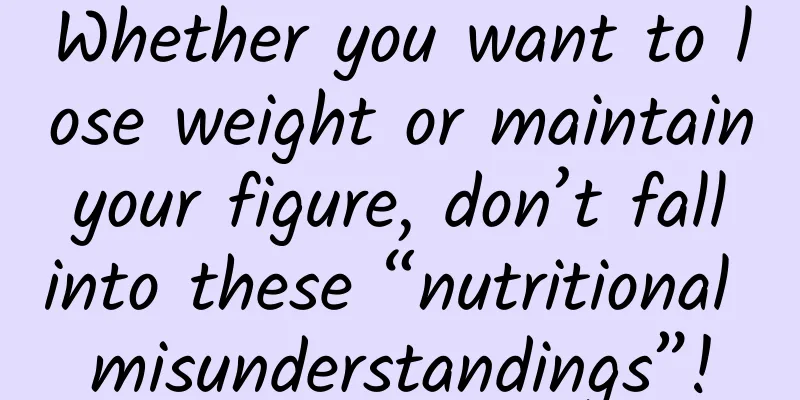Whether you want to lose weight or maintain your figure, don’t fall into these “nutritional misunderstandings”!

|
Xiaofang is a girl who loves beauty. In order to maintain her slim figure, she eats as much vegetables as possible, such as lettuce and cucumber, and various fruits every day. As for fish and meat, she avoids them if she can. As a result, when I went to the hospital for a physical examination, I found that I had severe anemia. Nowadays, people have higher requirements for health and body shape, and many people who love beauty have advocated vegetarianism . Let us take a look at these nutritional misunderstandings . Myth 1 Eating too much meat will make you fat. Suffer from many chronic diseases and have low nutritional value Meat dishes generally refer to animal foods such as fish, poultry, eggs, meat, etc. Since these animal foods contain a certain amount of saturated fatty acids and cholesterol, excessive intake may increase the risk of obesity, cardiovascular and cerebrovascular diseases and tumors. With the improvement of living standards, animal food has become more and more popular. Some people who pursue fashion have one-sidedly understood the advice of "eat more vegetables and fruits" in nutrition education, and blindly increased their vegetable intake while ignoring the nutritional value of animal food. In fact, animal foods such as fish, poultry, eggs, and meat are important sources of nutrients such as high-quality protein, lipids, fat-soluble vitamins, and minerals for humans , and are an indispensable and important part of a balanced diet. Especially fish , its protein amino acid composition is close to what the human body needs, and its utilization rate is high. Fish fat is mostly composed of polyunsaturated fatty acids, which plays an important role in lowering cholesterol and reducing atherosclerosis. Poultry and livestock meat and eggs also have their own nutritional value. The amino acid composition of poultry protein is similar to that of fish, and the utilization rate is relatively high. Poultry meat is rich in protein, lipids, vitamin A, B vitamins, and minerals such as iron and zinc. Eggs also have high nutritional value. The yolk is rich in vitamins and minerals, and the variety is relatively complete. The lecithin contained in it has the effect of lowering blood cholesterol. Myth 2 Eat more vegetables to lose weight Vegetables are rich in vitamins, minerals, dietary fiber and phytochemicals, high in water and low in energy. Therefore, they do play an important role in maintaining health, maintaining normal intestinal function, improving immunity, and reducing the risk of chronic diseases such as obesity, diabetes, and hypertension. But some people think that they can lose weight by eating more vegetables, but this is not entirely true. The two important factors for maintaining a healthy weight are the amount of food you eat and the amount of exercise you do. Food provides energy to the human body, while exercise consumes energy. If you take in too much energy and don't exercise enough, the excess energy will be stored in the body as fat, causing overweight and obesity. Therefore, from a dietary perspective, if you want to lose weight, you need to reduce the energy intake in your diet. Due to traditional Chinese cooking methods, a large amount of cooking oil is often added when stir-frying vegetables. Therefore, while eating a large amount of vegetables, a large amount of high-calorie fat is also consumed, which runs counter to the original intention of losing weight. It should be noted that although vegetables are rich in nutrients, the more you eat, the better. The dietary fiber in vegetables will affect the absorption of nutrients such as calcium, iron, and zinc. Therefore, the Chinese Nutrition Society recommends that adults in China only need to eat 300-500 grams of vegetables a day. Myth 3 Vegans have no nutritional problems Vegetarianism seems to have become a fashion and the pursuit of many environmentalists. Vegetarianism does have some benefits: vegetarians consume less fat; vegetarianism can lower the cholesterol level in the blood and prevent the occurrence of chronic diseases such as hyperlipidemia, hypertension, and cardiovascular and cerebrovascular diseases; vegetarianism can reduce the burden on the kidneys and reduce the occurrence of kidney disease, etc. However , vegetarians are not without nutritional problems. If vegetarians do not have a reasonable diet, they are likely to have the following nutritional problems: (1) Insufficient protein intake. Protein is a nutrient necessary for the formation of tissue cells in our body. It mainly comes from animal and plant foods such as meat, milk, eggs, and beans. People who choose a vegan diet can only take in protein from plant foods to meet the body's needs, but many vegetarians do not take in enough protein, which will cause physical strength to decline, difficulty concentrating, and the body's resistance to disease will also decrease. Therefore, vegetarians should effectively use plant protein, such as soybeans and soy products, which are good high-quality proteins. (2) Lack of trace elements. Iron deficiency is another common problem for vegetarians, especially women. Vegetarians do not eat meat, which will lead to insufficient iron intake in the body. In the long run, this will lead to symptoms such as anemia, loss of appetite, fatigue and weakness. Calcium deficiency is also a common phenomenon among vegans, who are prone to osteoporosis, leg cramps, and bone fractures. In addition, vitamin B12 deficiency is also common among vegetarians. Lack of vitamin B12 can cause pernicious anemia, loss of appetite, headaches, memory loss and other symptoms. So how should we correctly evaluate the nutritional value of food? Food is made up of nutrients, which include protein, fat, carbohydrates, dietary fiber, minerals, vitamins and water. Different types of food have different nutritional values. Nutritional value refers to the extent to which the nutrients and energy contained in food can meet the nutritional needs of the human body. The nutritional value of food depends on whether the types of nutrients in the food are complete, the amount of nutrients, whether the mutual proportions are appropriate, and whether they are easy to digest and absorb. The nutritional value of food is relative. For example, the nutritional value of energy, carbohydrates, and fat in rice, noodles, and oily foods is high, but the nutritional value of protein is very low; the nutritional value of protein in milk is high, but the nutritional value of iron is low. That is, the nutritional value of the same type of food is different due to different strains, parts, origins, maturity, and other factors. Assessing the nutritional value of food can provide a comprehensive understanding of the natural composition and nutritional deficiencies of various foods, understand the possible changes and losses of nutrients during processing and cooking, and guide people to rationally select food to achieve a balanced diet and promote health. |
<<: Transparent glass is "outdated", color-changing glass is here!
Recommend
Drones are still a niche toy industry or may usher in a blue ocean era
There is a question on Zhihu, an online Q&A c...
Parents and pigeons are superstitious...
After stepping on a manhole cover, I quickly aske...
A strong tornado in Guangdong caused many casualties. How should we prevent it?
Around 15:00 on April 27, a tornado hit Zhongluot...
The efficacy, effects and taboos of dog meat
Dog meat is also known as fragrant meat, local sh...
WeChat payment practice version
Source code introduction: Through the call of cod...
Why do we sleep? Massachusetts General Hospital discovers the first replay phenomenon in the human brain's motor cortex
"This is the most direct evidence yet of rep...
[2017 latest edition] A complete list of professional terms in the mobile Internet industry!
Based on the feedback from previous students on Q...
How to optimize the promotion account with ROI quadrupled in 3 months and annual turnover of 100 million?
Today's content is about a time when the boss...
The most "stinky" review in history, after testing all these snail noodles, we advise you not to eat this ingredient packet
How crazy are Chinese people about snail noodles?...
From the five-seater version of the Q-M9 to the coupe SUV of the Zhijie R7, Hongmeng Zhixing, which has entered its explosive period, has all
On September 10, Huawei released a three-fold scr...
How to view private domain traffic, live broadcasts by internet celebrities, IP, and knowledge payment?
In 2020, how should we view the development and d...
If you don't wash it for a week, it will be dirtier than the toilet. How dirty are beauty sponges? How should you choose one?
For those who often wear makeup, beauty sponges a...
One move to win? Can the curved screen Note Edge save Samsung?
Compared to ordinary users' expectations for ...
Where has the enterprising spirit of Snapdragon and Kirin gone as their performance has stagnated?
In recent days, everyone's attention has been...
Play with short videos and learn how to create a profitable TikTok account from scratch!
Why do Tik Tok ? How to make Tik Tok? For enterpr...









